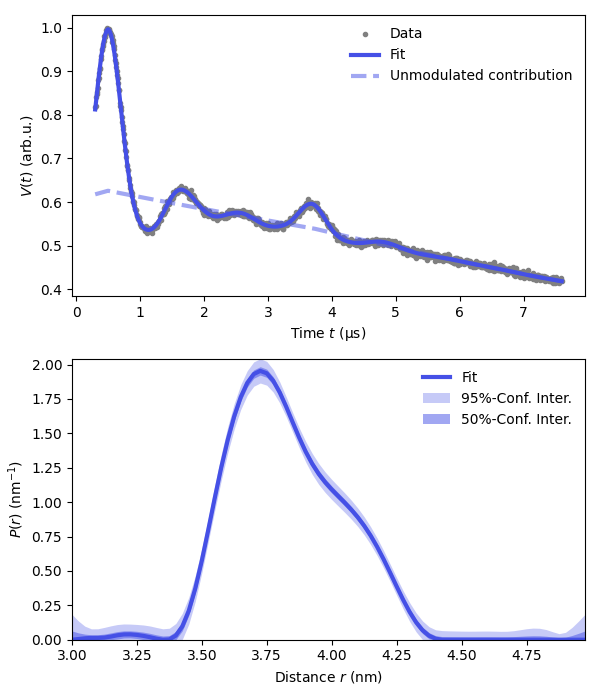Note
Go to the end to download the full example code.
Basic fitting of a 5-pulse DEER signal¶
This example shows how to model and fit a 5-pulse DEER signal, including the typically present additional dipolar pathway.
Now, the simple 5pDEER models contain 3 additional parameters compared to 4pDEER (due to the additional dipolar pathway present in the signal). However, the refocusing time of the second dipolar pathway is very easy to constrain and strongly helps stabilizing the results.
This pathway can even estimated visually from the signal or estimated from the pulse sequence timings. Thus, we can strongly constraint this parameters while leaving the pathway amplitudes pretty much unconstrained.
Import required packages
import numpy as np
import matplotlib.pyplot as plt
import deerlab as dl
# File location
path = '../data/'
file = 'example_5pdeer_1.DTA'
# Experimental parameters (reversed 5pDEER)
tau1 = 3.9 # First inter-pulse delay, μs
tau2 = 3.7 # Second inter-pulse delay, μs
tau3 = 0.5 # Third inter-pulse delay, μs
tmin = 0.3 # Start time, μs
# Load the experimental data
t,Vexp = dl.deerload(path + file)
Vexp = dl.correctphase(Vexp) # Phase correction
Vexp = Vexp/np.max(Vexp) # Rescaling (aesthetic)
t = t - t[0] # Account for zerotime
t = t + tmin
# Distance vector
r = np.arange(3,5,0.025) # nm
# Construct dipolar model with two dipolar pathways
experimentInfo = dl.ex_rev5pdeer(tau1, tau2, tau3, pathways=[1,5])
Vmodel = dl.dipolarmodel(t,r, experiment=experimentInfo)
# Fit the model to the data
results = dl.fit(Vmodel,Vexp)
# Print results summary
print(results)
Goodness-of-fit:
========= ============= ============= ===================== =======
Dataset Noise level Reduced 𝛘2 Residual autocorr. RMSD
========= ============= ============= ===================== =======
#1 0.004 0.979 0.082 0.004
========= ============= ============= ===================== =======
Model hyperparameters:
==========================
Regularization parameter
==========================
0.104
==========================
Model parameters:
=========== ========= ========================= ====== ======================================
Parameter Value 95%-Confidence interval Unit Description
=========== ========= ========================= ====== ======================================
lam1 0.349 (0.348,0.351) Amplitude of pathway #1
reftime1 0.500 (0.499,0.502) μs Refocusing time of pathway #1
lam5 0.061 (0.059,0.062) Amplitude of pathway #5
reftime5 3.701 (3.691,3.710) μs Refocusing time of pathway #5
conc 160.372 (159.220,161.525) μM Spin concentration
P ... (...,...) nm⁻¹ Non-parametric distance distribution
P_scale 1.095 (1.094,1.095) None Normalization factor of P
=========== ========= ========================= ====== ======================================
# Extract fitted dipolar signal
Vfit = results.model
Vci = results.modelUncert.ci(95)
# Extract fitted distance distribution
Pfit = results.P
Pci95 = results.PUncert.ci(95)
Pci50 = results.PUncert.ci(50)
Pfit = Pfit
# Extract the unmodulated contribution
Bfcn = lambda lam1,lam5,reftime1,reftime5,conc: results.P_scale*(1-lam1-lam5)*dl.bg_hom3d(t-reftime1,conc,lam1)*dl.bg_hom3d(t-reftime5,conc,lam5)
Bfit = results.evaluate(Bfcn)
Bci = results.propagate(Bfcn).ci(95)
plt.figure(figsize=[6,7])
violet = '#4550e6'
plt.subplot(211)
# Plot experimental data
plt.plot(t,Vexp,'.',color='grey',label='Data')
# Plot the fitted signal
plt.plot(t,Vfit,linewidth=3,color=violet,label='Fit')
plt.plot(t,Bfit,'--',linewidth=3,color=violet,alpha=0.5,label='Unmodulated contribution')
plt.legend(frameon=False,loc='best')
plt.xlabel('Time $t$ (μs)')
plt.ylabel('$V(t)$ (arb.u.)')
# Plot the distance distribution
plt.subplot(212)
plt.plot(r,Pfit,linewidth=3,color=violet,label='Fit')
plt.fill_between(r,Pci95[:,0],Pci95[:,1],alpha=0.3,color=violet,label='95%-Conf. Inter.',linewidth=0)
plt.fill_between(r,Pci50[:,0],Pci50[:,1],alpha=0.5,color=violet,label='50%-Conf. Inter.',linewidth=0)
plt.legend(frameon=False,loc='best')
plt.autoscale(enable=True, axis='both', tight=True)
plt.xlabel('Distance $r$ (nm)')
plt.ylabel('$P(r)$ (nm$^{-1}$)')
plt.tight_layout()
plt.show()

Total running time of the script: (0 minutes 13.296 seconds)